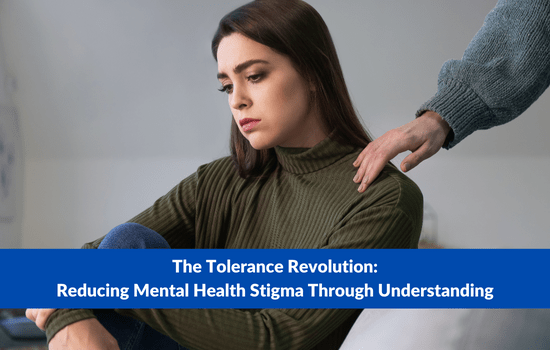Empathy plays a critical role in reducing mental health stigma and enhancing well-being. Participating in Bell Let's Talk Day on Wednesday, January 21, will help educate and develop a more tolerant world.
The Power of Understanding: Nurturing Tolerance to Combat Mental Health Stigma

Now more than ever, we must demonstrate empathy and kindness to others. Taking a moment to reach out to someone and actively listen to them can make a world of difference to that person.
Participate in Bell Let's Talk Day, an annual initiative that raises funds for mental health and gets stronger each year. The goal is to encourage everyone to use these strategies to end the mental health stigma and enhance well-being by starting a conversation about being more tolerant:
-
Start by listening, encourage open conversations, and actively listen without judgment.
-
Break the stigma by sharing your mental health experiences and challenges.
-
Educate yourself and learn about mental health to dispel myths and misconceptions.
-
Choose inclusive language that promotes understanding and avoids stigmatizing language.
-
Support mental health initiatives by getting involved in campaigns and organizations working to reduce stigma.
-
Normalize seeking help by encouraging professional help as a positive step for mental well-being.
-
Be empathetic through understanding that everyone's journey with mental health is unique; show empathy and compassion.
-
Challenge stereotypes by speaking up against stereotypes and correcting misinformation about mental health.
-
Promote inclusivity by fostering an inclusive environment where mental health is acknowledged and supported.
-
Encourage self-care by highlighting the importance of self-care practices for mental well-being.
What is Empathy?
Empathy is recognizing and understanding others' feelings and opinions by figuratively walking in their shoes or seeing things through their eyes. As we develop empathy, we become more tolerant, have more meaningful relationships, enjoy success in the workplace, and appreciate improved well-being and quality of life.
Empathy Can Be Learned And Taught.
Some of us are born with natural empathetic skills that we practice regularly; however, that certainly isn't the case with everyone. People often inquire if empathy is a skill that individuals can develop and if children and adults with autism spectrum conditions can be taught to empathize. The answer to both questions is yes, which is so encouraging!
Learning To Accept Others' Differences
When consulting with teams and individuals, I find one of the significant challenges is a lack of tolerance, particularly colleagues' inability to understand each other's perspectives and individual differences. If we can learn to place ourselves in someone else's position, we strengthen our empathy skills, enhancing mental health. As Maya Angelou said, "We’re more alike, my friend, than we are unalike."
There are numerous ways to reduce mental health stigma and become more tolerant. We can do this by practising these behaviours:
- appreciating we are more similar to each other than different
- taking the time to listen to others to become more empathetic and compassionate
- making an effort to connect with others by starting a conversation or asking questions
- being thoughtful of how and what we communicate with others
These behaviours will educate us to be more tolerant, increase well-being and reduce mental health stigmas. They will also improve our relationships with others and increase our overall joy and happiness. We offer one-on-one guidance with reaching goals, including self-development, team building, employee relationships, and more. Click here and be sure to check out many more motivational blogs here.
This article was originally published on January 26, 2019, and has been updated (January 2024).
More Motivational Reads Here »
How Emotionally Intelligent Are You?
Sign up for Linda's monthly tips to build your Emotional Intelligence and reduce Emotional Hijacking!

















